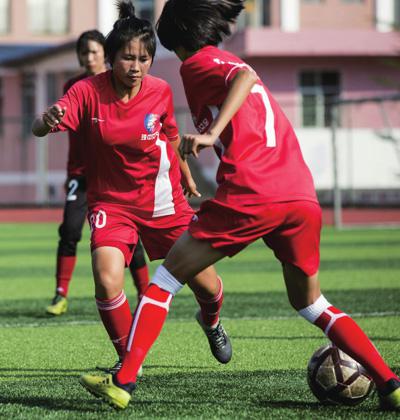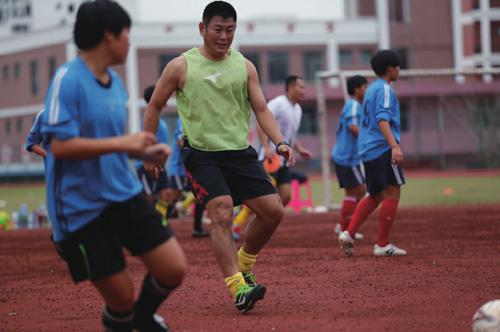THE BEAUTIFUL GAME
By Li Nan


On March 30, Xiao Shan, the coach of a girls football team in Hainan Province, was once again in the spotlight. Xiao and his team, the Qiongzhong Female Football Team (QFFT), won the 2017-18 You Bring Charm to the World Award, following their fairytale journey from amateurs to three-time world champions in little more than a decade. The prize is awarded to outstanding people in China across various fields.
Founded in February 2006, QFFT has won three consecutive world championships at the Gothia Cup and the Gothia Cup China since 2015. The Gothia Cup, named the World Youth Cup by international footballs governing body, FIFA, in 2007, is the largest and most international youth football tournament in the world. Held in Sweden every year, around 1,700 teams from 80 nations take part. Hosting its inaugural competition in 2016, the Gothia Cup China is the sister competition to its Swedish counterpart, which hosted 320 teams in Shenyang, northeast Chinas Liaoning Province, in 2017.
Unlike their rivals, whose players are mostly derived from professional academies and wealthy clubs, QFFT is an amateur-turned-professional team made up of minority girls from the poor mountainous inland of south Chinas Hainan Province.
The team is based in the Qiongzhong Li and Miao Autonomous County, an impoverished area where low rates of university enrollment and early marriage are the prevailing trends among minority girls. Xiao, a retired football player himself, gave up a well-paid job in the city and trained dozens of rural girls into world champions for minimal pay, lifting them out of poverty and empowering them to find a place in society.
Xiao is now hailed as a hero in Hainan courtesy of his players exploits at national and international competitions, which have also ignited a love of football among the tropical islands younger generation.
Amateurs to champions
Xiao was born into a footballing family in 1966 in north Chinas Shanxi Province. His father Gu Zhongsheng was the coach of the Shanxi Provincial Football Team and Xiao, who started playing football when he was 7, later became a professional player on his fathers team. His dream was to play for Chinas national team, but it was an aspiration that would go unfulfilled as he was forced to retire at the age of 28 due to injuries. Xiao later worked as a coach for a club in central Chinas Hunan Province, earning a handsome salary of over 30,000 yuan ($4,777) per month. However, Xiaos comfortable life was interrupted in 2005 by a phone call from his father, who had retired to Hainan. While living on the island, Gu had discovered that most rural girls of the Li ethnic group were well-built physically and willing to endure hardship, in part because they had to take mountain roads every day to get to school. Gu believed that this prepared them well for playing football. He soon signed an agreement with the local government to set up Hainans first female football team, aiming to lift the girls out of poverty through the sport.
Over 1,000 families signed their daughters up for the teams trials, knowing that those chosen would enjoy free accommodations and education at the best middle school in the county.
Gu invited Xiao to co-manage the team and, in his own words, “do something meaningful.”Xiao, inspired by the opportunity to produce one or two players for the national team that he himself had never reached, resigned from his club in Hunan and moved to Qiongzhong, a backwater county without even one traffic light.
Xiao and his father visited every town in the county to choose players for the team. Eventually 24 girls were chosen, almost all from poor families in the rural areas.
“Do you know what football is?” Xiao asked when he first met the girls.
“Yes. Its a volleyball which can be kicked with our feet,” was their reply.
Xiao was understandably worried, and a tight budget made matters worse, leaving the team underfunded and inadequately staffed. Besides being the coach, Xiao also served as the teams cook, driver and occasional doctor, all for a meager monthly remuneration of 1,500 yuan($238.85).
With Xiao struggling to manage, his wife Wu Xiaoli, once a high jumper herself, gave up her own well-paid job in Haikou, the capital of Hainan, to help out with the team. Wu was put in charge of cooking, mending shoes and training the players. “There was no money to hire more coaches, so I followed them on the pitch every day, learning how to play football and training myself to be an assistant coach,” Wu told Beijing Review.
The lack of available funds also led to shortages of food and clothing, and in 2008, the team almost ran out of food to eat. “Sometimes two players had to share one bowl of rice,” said Wu. To make ends meet, the couple began planting vegetables on a patch of deserted land on campus and collecting reusable waste to exchange for money. In 2008, the prize for the most hard-working player was an extra egg. Xiao asked for donations from local enterprises and organizations whenever he could to buy football sneakers and kits for the team. “It was a really difficult time,” Wu said.
After years of training and several national level games, the team began to show signs of progress. In 2009, QFFT came third in the National U16 Female Football Tournament, the first national-level prize of its kind for the island since Hainan was established as a province in 1988.

